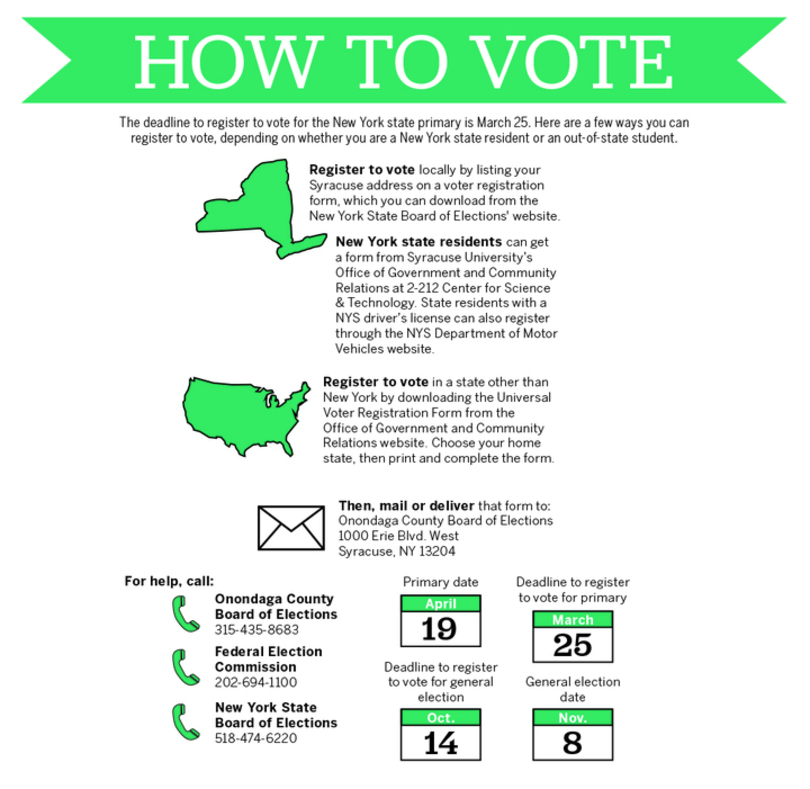Project encourages Syracuse University students to get engaged in primary and general elections

Colleen Simms | Design Editor
As the March 25 deadline to register to vote for the New York state primary approaches, Syracuse University’s Student Voter Registration Project is encouraging students to get involved in the presidential election and make informed political decisions.
The project is rooted in SU’s Office of Government and Community Relations, and has expanded this year to partner with the Citizenship and Civic Engagement (CCE) program at the Maxwell School of Citizenship and Public Affairs.
The immediate goal of the project is to increase voter registration and registration turnout at both the New York state primary election, which will be held on April 19, and the general presidential election, which will be held on Nov. 8, said Kennedy Patlan, a sophomore CCE and advertising dual major who directs the project, in an email.
“The campus has an opportunity to change how we look at politics, activism, and civic engagement,” Patlan said, in regard to other goals of the project. “I think that if we can get students to think about these things a bit more, and how decisions affect our SU community and beyond, that that is something really powerful.”
Diana Napolitano, assistant director of government relations at SU, said in an email that the project also strives to “inspire students so that they remain civically active not just here on campus, but during their post-college lives.”
Beyond “headline” congressional and presidential races, Napolitano said it is important for students to get involved in elections for school boards, town councils, state offices and judicial posts, among others.
“We all need to remember that our votes have the most influence at the local level,” she said.
In addition, Patlan said the project aims to give students the tools to be efficient and knowledgeable voters by educating them about the voting process and individual candidates, regardless of party affiliation or political beliefs, Patlan said.
Before becoming involved in the project, Patlan said she was “like a lot of students” in that she wasn’t fully informed about candidates, unsure of her home state of Florida’s voting processes and timelines and hesitant about how much weight her vote could have in the outcome of the elections. Patlan said she thinks these are all reasons why students don’t tend to engage in the political process.
“It can be overwhelming, time-consuming, and nerve-wracking,” she said. “In a time when a lot of people are cynical about the political systems, it can definitely be hard to participate.”
To encourage students to get involved in the voting process, members of the project will table more to make voter registration forms more widely accessible to the student body, Patlan said. Project members will also provide students with registration dates, timelines and infographics to “help them navigate” both the primary and general elections, she said.
A survey distributed by the project examined where out-of-state students at SU come from in an effort to find how students can most effectively learn about absentee voting, since regulations on absentee voting differ from state to state, Patlan said. She added that students “are highly encouraged” to contact their local government offices for information about how and where they can vote as an out-of-state student.
“We want to provide students with the tools to be able to do these sorts of things, while also simplifying what can be a very complicated process,” Patlan said.
The survey was created by the project and its partners in the EDGE Development program — a program based in SU’s branch of the Public Relations Student Society of America — and The New House Advertising Agency, according to an SU News release. It found that out of 250 SU students who responded, 77 percent were not only registered to vote but also willing to vote in the general election, Patlan said. Fifty-nine percent of the survey respondents said they had never voted before, according to the release.
Napolitano said a reason why there is a discrepancy in the survey results between how many students were registered versus how many had actually voted before is that many of the survey’s respondents were first- and second-year students who registered to vote before the legal voting age of 18 and may have missed deadlines in actually voting in elections.
Patlan said the 77 percent statistic is “exciting more than anything” and counters descriptions of students in the media as “’lazy, selfish, uneducated and careless.’”
“We do care, and we do want to make a difference,” Patlan said. “But I think the biggest issue is the component of education and knowing how to actively use our rights. And hopefully this project can change that.”




